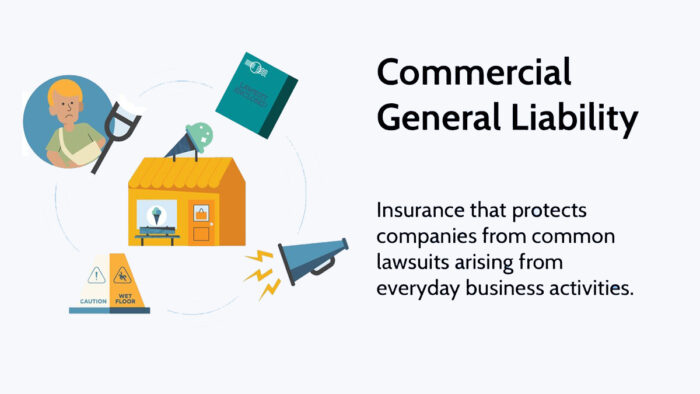Commercial General Liability (CGL) insurance protects your company from financial loss if you are found liable for property damage or personal and advertising injuries caused by your services, business operations, or personnel. It includes non-professional negligent acts. Understanding this coverage is a critical first step towards managing CGL risks.

Commercial general liability insurance is considered comprehensive business insurance, but it does not cover all of the potential issues that a company may encounter. Specific hazards that are generally excluded from CGL coverage include professional services, pollution, liquor, car liability, and directors and officers liability, with separate insurance plans available to cover these scenarios.
What Does Commercial General Liability Insurance Cover?
A CGL insurance policy will normally cover the costs of your legal defense and will pay for all damages if you are proven liable—up to the policy limits. Here is what standard CGL includes:
Bodily injury and property damage liability
Bodily injury and property damage coverage protects against damages resulting from the insured’s’ legal liability for bodily injury or property damage to others caused by non-professional negligent acts, as well as liability deriving from their premises or company operations. Even when there is no physical harm, mental and emotional discomfort can be termed bodily ailments.
Personal and advertising injury
Personal and advertising injury liability protects an insured from responsibility originating from specific offenses, such as:
- Libel Slander
- False arrest.
- Infringing on another’s copyright might result in malicious prosecution.
- Using another’s advertising idea
- Wrongful eviction, entry, or violation of privacy.
Medical payments
Limited coverage for medical payments includes benefits for injuries experienced by a non-employee as a result of an accident on the insured’s premises or while exposed to the insured’s business operations.
Medical payment coverage can be activated without judicial action. This allows for the fast settlement of smaller medical claims without the need for litigation.
It is included in the CGL policy and covers all required and reasonable medical, surgical, ambulance, hospital, professional nursing, and burial expenditures for a person wounded or killed in an accident on the insured’s premises or resulting from company operations.
What Does Commercial General Liability Insurance Not Cover?
CGL insurance commonly excludes the following:
- CGL insurance often excludes coverage for bodily injury or property damage caused by the insured’s willful acts or misbehavior.
- Claims relating to employment practices, such as discrimination, harassment, or wrongful termination, are frequently excluded through endorsement of a CGL policy. These risks underline the importance of separate employment practices liability insurance.
- CGL policies often exclude liability for professional services or advice through an exclusive endorsement. Professionals such as architects, engineers, and consultants frequently require professional liability insurance to cover these risks.
Pollution-related damages are typically excluded from basic CGL insurance, necessitating supplemental pollution liability coverage for enterprises that are exposed to environmental risks.
As cyber dangers evolve, it’s worth noting that CGL plans often exclude liability resulting from data breaches or cyber assaults. Cyber liability insurance is essential to protect against these special hazards.
Understanding CGL limits and deductibles is very important as an insured.
How Much Does Commercial General Liability Insurance Cost?
Commercial general liability insurance costs vary depending on the size of the covered business, the riskiness of its operations, and the amount of coverage required. Some insurers claim that their clients pay between $300 and $600 for a million dollars in insurance coverage. Others suggest their clients may spend up to $1,000.
Frequently Asked Questions
What are the three forms of commercial general liability?
CGL coverage is divided into three categories: bodily injury and property damage, advertising and personal harm, and medical costs, with each addressing certain parts of possible
What is a commercial general liability occurrence?
A commercial general liability (CGL) policy form defines an occurrence as an event that involves continuous or repeated exposure to basically the same general hazardous conditions.
What’s the difference between general liability and commercial general liability?
Commercial general liability insurance, also known as CGL insurance, protects your company from claims that it caused bodily harm or property damage to others. This coverage is commonly referred to as general liability insurance or commercial liability insurance.
Who is insured under a CGL policy?
Individuals include both the named individual and their spouse. Partnerships, or joint ventures include named partnerships, joint ventures, partners, members, and their spouses. Limited Liability Company: The LLC, its members, and managers. Organization (Corporation): The named entity, its executives, directors, and stockholders.
What is a trigger in a commercial general liability coverage form?
The coverage trigger is the event that must occur before a liability policy applies to a specific loss.



